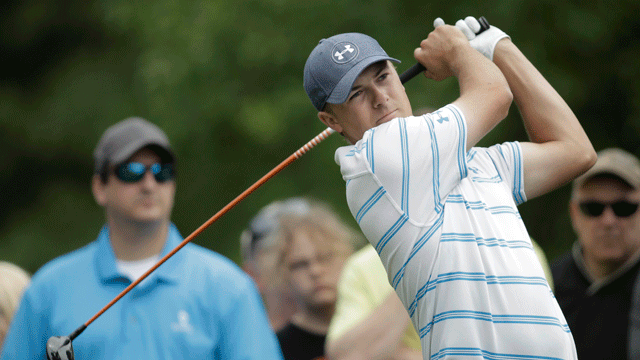NEWS
Jordan Spieth arrives at U.S. Open with life changed since Masters
By Bob Cohn
Published on

Jordan Spieth did not simply show up at the Academy of Country Music Awards in April. He announced one of the winners. Did Spieth just watch and cheer his Dallas Mavericks during the playoffs? Please. He got a personalized jersey at midcourt from owner Mark Cuban. In the home stretch of a long TV career, David Letterman was pretty picky about his "Late Show" guests. Yet he seemed to enjoy hobnobbing with Spieth, as did Bill Clinton, who sought some face time with Spieth.
Spieth was here, there and everywhere after winning the Masters, a signature achievement for any professional golfer and perhaps the biggest prize of all. But for Spieth, the victory carried extra meaning. It was his first win in one of the four major tournaments: the Masters, U.S. Open, British Open and PGA Championship.
At 21, Spieth is on the cusp of becoming the next big thing. He is ranked No. 2 in the world behind Rory McIlroy, the latest next big thing. But big thing or not, regardless of rankings, winning that first major has a profound effect, at least in the short term.
"What immediately happens is you become inundated with stuff," said Mike Shapiro, who worked for Nike as Woods' brand manager during a long career in the sports and entertainment businesses.
"People want your time, they want to deal with you. They want you to endorse products. You have to do every shoot, every interview. All of a sudden you rise to the level of, not immediate stardom, but you become the prettiest girl at the dance. Until the next major."
That would be the U.S. Open starting Thursday at Chambers Bay in University Place, Wash.
"The four majors are the tournaments that really are the proving grounds for golfers," said Bob Dorfman, executive creative director at Baker Street Advertising in San Francisco and sports marketing blogger. "No matter how many events you win, until you win a major you're not quite there yet. Not to say that everyone who wins a major is great, but it puts you in that category."
At 21, Spieth already might be great.
"Winning a Masters is a huge thing and a big jump and really vaults him to the next level," Dorfman said.
It also elevated Spieth to what agent Andrew Witlieb called "a different economic climate."
Spieth, the second-youngest golfer to win a Masters (after Tiger Woods) and the first of any age to achieve 19-under par, filled the pockets of his size-42 green jacket with a $1.8 million winner's purse. He will need a bigger jacket. Dorfman said the win might translate into another $10 million annually in endorsements.
It certainly changed the economic climate at Under Armour, the apparel and equipment manufacturer and one of Spieth's top sponsors.
"Thanks to Jordan, our company grew up today," company CEO and founder Kevin Plank told ESPN. "He was like apple pie with a golf club. There was nothing more Americana than Jordan Spieth this weekend."
But there is a catch to the climate change.
"It depends on who it is, if it's somebody that's a big name," Dorfman said. "If Rickie Fowler won a major, it would be huge for him. You're talking about a couple of million dollars in endorsement income."
Clearly, Spieth is a big name. He and McIlroy shine as the brightest young stars in the game. But for lesser players who win a major, the effect often is lessened. Think Trevor Immelman, whose first and last major win was the 2008 Masters, or Y.E. Yang, the 2009 PGA Championship winner, or Rich Beem, who won the 2002 PGA. They are not the only one-hit wonders.
"When you don't play well, it all goes away," said Witlieb, whose Legacy Agency represents 2003 U.S. Open winner Jim Furyk. "Charl Schwartzel. He won a Masters (in 2011), and nobody cares. It was a little bit of not being an American, but a lot of it is he hasn't won (any majors) since. There have been a bunch of guys who won majors and then fell off the map."
Witlieb has heard how winning a major changes one's life, "but I don't know if I buy that," he said. "What really changes your life is backing up the major and continuing to play well for a period of time."
Shapiro, whose latest endeavor is president, general manager and part-owner of the San Rafael Pacifics, an independent-league baseball team in Northern California, said he prefers to appreciate more the "human" effect of winning a major for the first time.
"These are men, and women, who have labored on the practice range for hours and hours of lonely personal time," he said. "A tremendous amount of time working with coaches, a lot of time away from family and incredible pressures week after week. And all of a sudden, they rise. After all that hard work and sacrifice it ultimately pays off.
"The viewer watches a four-day tournament or casually watches, and they don't get to see what goes into becoming successful and the sacrifices they make," Shapiro said. "If you labored in obscurity all these years and then have that one moment in the sun, how validating is that? If you really want to understand the heart and soul of the game, it's what goes into success and it's what it takes to be successful."
This article was written by Bob Cohn from The Pittsburgh Tribune-Review and was legally licensed through the NewsCred publisher network.